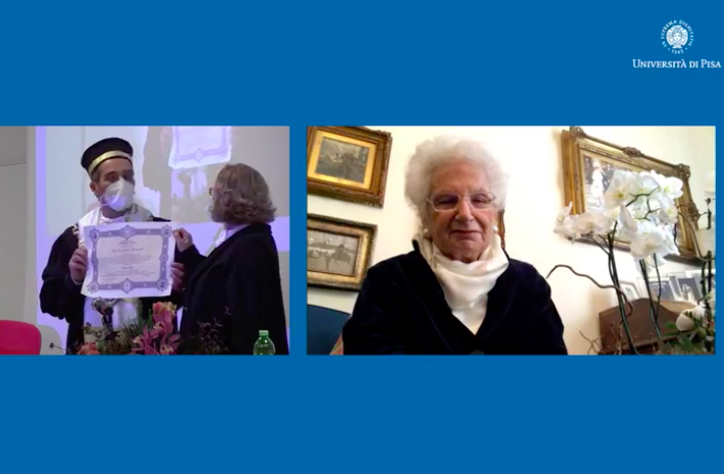Holocaust survivor Liliana Segre, witness and teacher of peace

Her constant dedication in promoting “social justice, peaceful coexisting and the disavowal of any conflict” earned Liliana Segre a new honorary degree in Peace Studies, awarded to her last week by Pisa University. The ceremony was held in the concert hall of the university centre San Rossore 1938, a name which commemorates the racial laws signed there by King Vittorio Emanuele III that very year.
Among the many merits of the Senator for Life there is “upholding the history and the Memory of the Shoah, making it an instrument to nurture, among youngster first and foremost, those values of fellowship and respect in which our university fully identifies”, Dean Paolo Mancarella noted.
She is an extraordinary peace ambassador, “in a time where Italy finds itself divided and inconsistent with values that are supposed to be shared”.
Ideally, for Pisa University this is the continuation of the commitment made in the eightieth anniversary of the promulgation of the anti-semitic policies through the “ceremony of apologies and remembrance”, dedicated to the Jewish teachers and students who were then ousted.
The motivation for the honorary degree was read by Professor Eleonora Sirsi, Head of the Master’s Degree in Peace Studies. The Senator for Life accepted the acknowledgment with emotion, then thanked her friend Goti Herskovitz Bauer, who was remotely connected to the ceremony. Segre, recalling her friend’s essential role in making the commitment of witnessing, defined her a true “life teacher”.
“Today – Segre pointed out – you wanted to honor me with this honorary degree, and I wholeheartedly thank you. All I can say is that, within the limits of my power, I will contribute in witnessing and promoting historical values, which I deem imperative not only to respect the past, but mostly to respect the future. To ensure a future open to coexistence, respect, dialogue, solidarity, hospitality”.
Liliana and Goti: a bond born in the name of Memory, of awareness, of love for the young. Historian Gadi Luzzatto Voghera, director of the Contemporary Center for Jewish Documentation Foundation (CDEC), praised the two women who “understood the urgency of a world at risk to forget, offering their voice with untiring generosity”. Decades of engagement that helped reinforce the meaning and the scope of the historiographical debate, in the name of a relationship that Luzzatto Voghera defined as “inextricable”: the one between History and Memory.
“If Liliana Segre’s words and deeds represent a pledge getting its strength from being aware of the possibility to impact who is gifted the testimony of her experience, our pledge must be a pledge to coherence”, UCEI President Noemi Di Segni stated. A pledge to listening and to action, she added, “similar to the one which took place at the foot of Mount Sinai”, because, “unlike an ordinary commitment, which involves just the one who makes it, committing to Memory reverberates on the next generations”. Coordinated by Professor Fabrizio Franceschini, director of the university’s Jewish studies interdepartmental centre, the ceremony opened with the presentation of the book “Il dovere della parola. La Shoah nelle testimonianze di Liliana Segre e di Goti Herskovitz Bauer” (The duty to talk. Shoah in the testimonies of Liliana Segre and GotiHerskovitz Bauer), by Marina Riccucci and Laura Ricotti, published by Pacini with Fondazione Livorno. Various representatives of institutions intervened.
Taking the stage, among others, were the Mayor, Michele Conti, Prefect Giuseppe Gastaldo, Councilor Alessandra Nardini.
Translated by Silvia Bozzo, student at the Advanced School for Interpreters and Translators of Trieste University, and revised by Oyebuchi Lucia Leonard, student at Trieste University, interns at the newspaper office of the Union of the Italian Jewish Communities.
